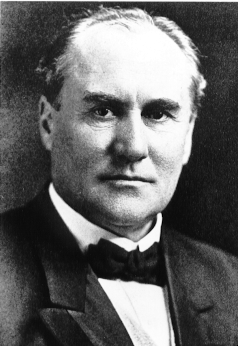
Henry Augustus Buchtel was an American minister, educator, and public official. He was the seventeenth governor of Colorado.

James Whitford Bashford was a bishop of the Methodist Episcopal Church in the United States and the first bishop of the Methodist Episcopal Church in China.
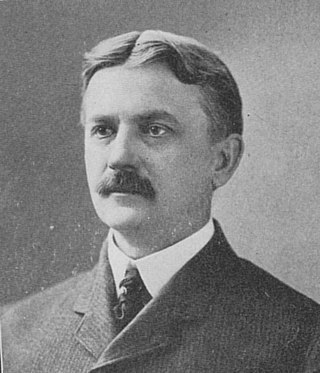
David Hastings Moore was an American bishop of the Methodist Episcopal Church, elected in 1900. He gained notability as a Union Army officer in the American Civil War, as a pastor, as the editor of a Methodist periodical, and as a university chancellor.
Merriman Colbert Harris was a Missionary Bishop of the Methodist Episcopal Church, elected in 1904, who was active in late nineteenth and early twentieth century Japan.

American Methodist Episcopal Mission was the missionary society of the Methodist Episcopal Church that was involved in sending workers to countries such as China during the late Qing dynasty.

John McKendree Springer was an American bishop of the Methodist Episcopal Church and The Methodist Church, elected in 1936. He was also a pioneering missionary instrumental in developing Methodism on the continent of Africa.
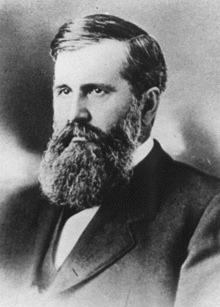
Samuel Hitt Elbert was an attorney in the Nebraska Territory before settling in the Colorado Territory. He served as the second Secretary of the Territory of Colorado from 1862 to 1866 and he served as the sixth Governor of the Territory of Colorado from 1873 to 1874. After Colorado statehood, he was a justice of the Colorado Supreme Court from 1876 to 1888 and was chief justice from 1879 to 1882.

Riverside Cemetery, established in 1876, is Denver, Colorado's oldest operating cemetery. More than 67,000 people are buried there, including 1,000 veterans.
Medical missions in China by Catholic and Protestant physicians and surgeons of the 19th and early 20th centuries laid many foundations for modern medicine in China. Western medical missionaries established the first modern clinics and hospitals, provided the first training for nurses, and opened the first medical schools in China. Work was also done in opposition to the abuse of opium. Medical treatment and care came to many Chinese who were addicted, and eventually public and official opinion was influenced in favor of bringing an end to the destructive trade. By 1901, China was the most popular destination for medical missionaries. The 150 foreign physicians operated 128 hospitals and 245 dispensaries, treating 1.7 million patients. In 1894, male medical missionaries comprised 14 percent of all missionaries; women doctors were four percent. Modern medical education in China started in the early 20th century at hospitals run by international missionaries.

Leonora Howard King was a Canadian physician and medical missionary who spent 47 years practising medicine in China. She was the first Canadian doctor to work in China, where she died in 1925.
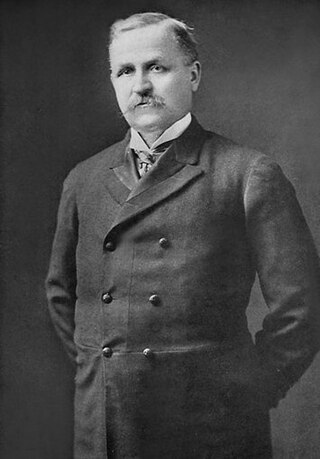
William Scott Ament was a missionary to China for the American Board of Commissioners for Foreign Missions (ABCFM) from 1877, and was known as the "Father of Christian Endeavor in China." Ament became prominent as a result of his activism during the Boxer Uprising and controversial in its aftermath because of the personal attacks on him by American writer Mark Twain for his collection of punitive indemnities from northern Chinese villages.

George Carleton Lacy was an American Methodist missionary and the last Methodist Bishop in Mainland China.

Francis Dunlap Gamewell was a Methodist missionary in China. He was the chief of the Fortifications Committee in the Siege of the Legations during the Boxer Rebellion in 1900 and was acclaimed as one of the heroes of the siege.

Chinese Recorder and Missionary Journal was a journal, pamphlet or magazine published in one or another form in Shanghai from 1867 to 1941, after which it was closed by Japanese authorities. The Journal was the leading outlet for the English language missionary community in China, with a number of Chinese readers as well. In the 1920s and 1930s, under the editorship of Frank J. Rawlinson, it was known for its liberal theology and support for Chinese nationalism.

Mary Stone, also known as Shi Meiyu, was a doctor of medicine graduated from the University of Michigan. She founded Danforth Memorial Hospital in Kiukiang.

Woman's Foreign Missionary Society of the Methodist Episcopal Church was one of three Methodist organizations in the United States focused on women's foreign missionary services; the two others were the WFMS of the Free Methodist Church of North America and the WFMS of the Methodist Protestant Church.

William James Hall was a medical and religious missionary in Korea, primarily in the capital city of Pyongyang during the 1890s. Upon graduation from medical school, he continued working in New York and was appointed as Medical Superintendent at the Madison Street Medical Mission under the supervision of the Methodist Episcopal Church. As a result of his work with the M.E. Church in New York City, Hall met his future wife, Rosetta Sherwood, who also applied to serve in the mission alongside Hall. Both Sherwood and Hall dedicated their professional life to mission work, serving in Korea starting on October 10, 1890, for Rosetta, and December 15, 1891, for William James. During his three-year stay in Korea, Hall greatly expanded the Methodist Mission, providing medical, emotional and spiritual care for Korean soldiers and Pyongyang residents during the First Sino-Japanese War. Hall was a victim of political transgressions, and ultimately died of typhus on November 24, 1894, while tending to wounded men on the banks of the Taedong River.

Jennie V. Hughes was an American Methodist missionary in China. She co-founded the Bethel Mission in Shanghai with Chinese doctor Shi Meiyu.
Lucinda L. Combs-Stritmatter was an American physician who was the first female medical missionary to provide medical care in China. She is credited with establishing the first women's hospital in Beijing. Combs was a pioneer in women's medical care while serving the Women's Foreign Ministry Society's North China Mission for seven years.
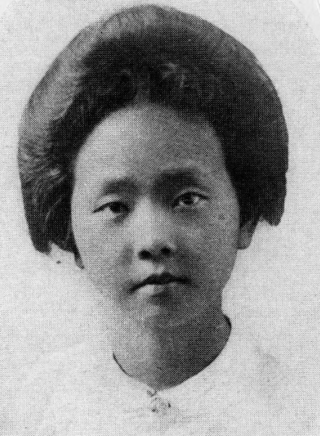
Phebe Stone was a physician and medical missionary who worked in Kiukiang (Jiujiang), China. She was the younger sister of the notable missionary Mary Stone, also known as Shi Meiyu. Her family was from the Hubei province in China and were one of a handful of Christians in the area. Stone went on to Goucher College in the United States for her undergraduate degree and later was awarded a fellowship to attend Johns Hopkins, where she received medical degree in 1918. Stone was the first Chinese woman to graduate from Johns Hopkins School of Medicine. Afterward, Stone briefly worked as a medical intern at a women's hospital in Worcester, Massachusetts, then returned to her hometown of Jiujiang to take over the Danforth Hospital established by her sister Mary. She later founded the Bethel Mission and its encompassing hospital in 1920 along with Mary and the American missionary Jennie Hughes. She contracted tuberculosis and died in 1930.

















